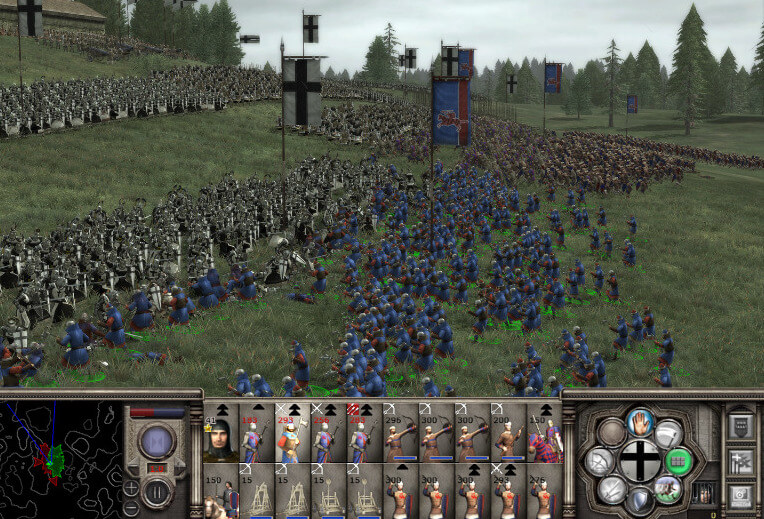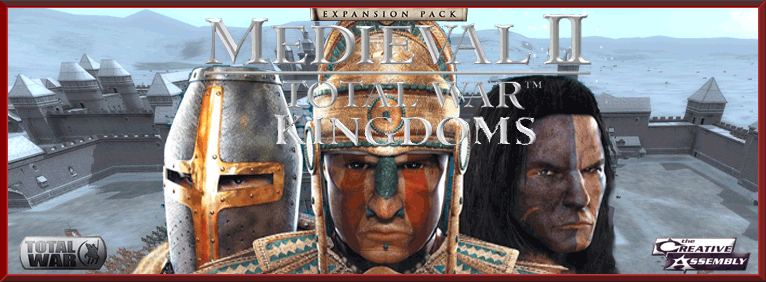
Time will tell who can come through blood and iron to unite Britannia.

Perhaps worst of all, dissent smolders within its own borders, in the form of the Barons' Alliance, which threatens to unify into a full-fledged rebellion. England is the largest and richest faction in the isles, however they are very thinly spread, and incursions into their territories from the Welsh, Irish and even perhaps the Scots or Norwegians, seem inevitable unless action is taken. Finally, the warlike Norwegians are returning to the Isles, having held the Isle of Man and the Hebrides for some time, their king coming personally to oversee the conquest of Britannia. In the north, the English are allied with the fierce Scots, but this bond is untenable, and the only remaining question is when war with the Scottish kingdom will erupt. On the Marches, Prince Llywelyn ap Gruffudd of the Principality of Wales threatens the lightly held English border fortresses. However, the Gaelic chieftain Brian O'Neill has succeeded in rallying the Gaelic Irish, and despite their lack of heavy infantry, with a strong push they may seize the island. In the far west, on Irish soil, England tenuously holds a network of fortresses that keep the Irish at bay. The Kingdom of England exercises influence over most of the Isles, but its power is contested from several theatres. Sacrificing upholds the religion of the Sun God and increases the happiness of the local populace.Īt the beginning of the Britannia campaign in 1258, the British Isles are in chaos. They can also sacrifice populations upon capturing a settlement or they can sacrifice captured enemy troops. The Chichimeca can also use enemy technology to their advantage.Īll of the factions adhering to the "Sun God" religion are able to sacrifice units instead of disbanding them. The Apache can also learn from the technologies of European factions-after battling a European faction such as New Spain, the Apache will be able to construct gun trading tipis and horse trainers, unlocking new, more technologically advanced units (such as cavalry and musketeers, which the faction initially lacks). The Apachean Tribes faction has access to the "warpath" ability, which is a shamanistic counterpart to the jihad in the main campaign. These titles unlock more advanced building levels for the player to use. When the player progresses through the campaign playing as New Spain, the player will be presented with missions from the King of Spain, and when sufficient influence is gained, the player may be granted a higher title of nobility such as Baron, Count, etc.


The native factions have weaker units with little armor, but their extremely low upkeep allows vast numbers of them to be fielded and they generally possess high morale. These conquistador forces consist of small numbers of expensive but powerful European units, their numbers often bolstered by local native mercenaries. French and English forces will show up in the same way: the French appear in Louisiana and the English in Honduras. Once spawned, the Spain faction can use these armies however they see fit. This campaign depicts various conquistador armies that travelled to the New World by spawning large, formidable armies in the Americas with allegiance to the Spanish. The Spanish must struggle to explore an unknown land filled with violent natives, while the Indigenous peoples attempt to stall the Spanish invasion and simultaneously expand their lands at the expense of their neighbors. Non-playable factions are playable in a quick battle or a custom battle.īeginning in 1521, the Americas campaign depicts the early period of the Age of Navigation, during which the European powers sought new land through colonisation. Kingdoms has four new campaigns, each one focusing on a different geographical area during a period of great change in its history.


 0 kommentar(er)
0 kommentar(er)
